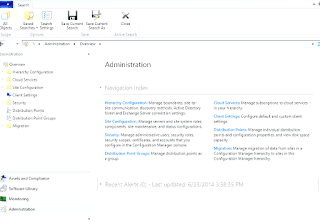System Center Configuration Manager (SCCM, also known as ConfigMgr), formerly Systems Management Server (SMS) is a systems management software product developed by Microsoft for managing large groups of computers running Windows NT, Windows Embedded, macOS (OS X), Linux or UNIX, as well as Windows Phone, Symbian, iOS and Android mobile operating systems. Configuration Manager provides remote control, patch management, software distribution, operating system deployment, network access protection and hardware and software inventory.
History
Help Desk SCCM client Tool part of course - Join 20000+ Members https://jobskillshare.org.
System Center Configuration Manager has evolved since Microsoft originally released it as "Systems Management Server" in 1994. Significant releases include:
- Systems Management Server 1.0, released in 1994 along with Windows NT Server 3.5. This initial release targeted the management of MS-DOS, Windows for Workgroups, Windows NT, Macintosh and OS/2 desktops on Windows NT Server, NetWare, LAN Manager and Pathworks networks.
- Systems Management Server 1.1, released in 1995 to help customers migrate to Windows 95.
- Systems Management Server 1.2, released in 1996 with new remote-control, SNMP, inventory, and network-monitoring capabilities.
- Systems Management Server 2.0, released in 1999 to help with Y2K remediation efforts.
- Systems Management Server 2003, released in 2003 with improved stability, reliability, and software-distribution capabilities.
- System Center Configuration Manager 2007, released in 2007 with support for Windows Vista and Windows Server 2008.
- System Center Configuration Manager 2012, released in 2012 with significant changes to application deployment capabilities.
- System Center Configuration Manager 1511, released in November 2015 to support Windows 10 and new Windows servicing options.
- System Center Configuration Manager 1602, released March 11, 2016. New features include conditional access for PCs, Office 365 Update Management, greater management of mobile devices and of Windows 10.
- System Center Configuration Manager 1606, released July 22, 2016. New features include support for managing new Windows 10 features like Windows Information Protection and Windows Defender Advanced Threat Protection, improved integration with the Windows Store for Business supporting online and offline-licensed apps, and more.
- System Center Configuration Manager 1610,released in November 2016
- System Center Configuration Manager 1702, released March 2017
- System Center Configuration Manager 1706, released July 2017
- System Center Configuration Manager 1710, released November 2017
SMS went through three major iterations:
- The 1.x versions of the product defined the scope of control of the management server (the site) in terms of the NT domain being managed.
- With the 2.x versions, that site paradigm switched to a group of subnets to be managed together.
- With SMS 2003 the site could also be defined as one or more Active Directory sites.
The most frequently used feature is software deployment, which provides installation and updating of Windows Apps, legacy applications and Operating Systems across a business enterprise.
SMS 2003 saw the introduction of the Advanced Client. The Advanced Client communicates with a more scalable management infrastructure, namely the Management Point. (A Management Point (MP) can manage up to 25000 Advanced Clients.) Microsoft introduced the Advanced Client to provide a solution to the problem where a managed laptop might connect to a corporate network from multiple locations and thus should not always download content from the same place within the enterprise (though it should always receive policy from its own site). When an Advanced Client is within another location (SMS Site), it may use a local distribution point to download or run a program, which can conserve bandwidth across a WAN.
Components
SCCM components include:
- Policy Infrastructure
- Service Window Manager
- State System
- Center Configuration Manager Scheduler (CCM Scheduler)
- Center Configuration Manager Configuration Item Software Developers Kit (CCM CI SDK)
- Desired Configuration Management Agent (DCM Agent)
- Desired Configuration Management Reporting (DCM Reporting)
- MTC
- CI Agent
- CI Store
- CI Downloader
- CI Task Manager
- CI State Store
- Content In[fra]structure
- Software Distribution
- Reporting
Requirements
System Center 2012 Configuration Manager client may require Microsoft Policy Platform (to allow a client to evaluate compliance settings).
See also
- Microsoft Servers
- Microsoft System Center
- Data Protection Manager
- Operations Manager
- Virtual Machine Manager
- Configuration management
- Windows Server Update Services
- SYDI
References
External links
- Official website
